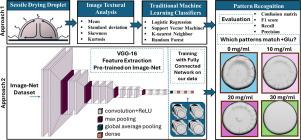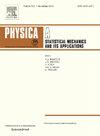Pattern recognition of drying lysozyme–glucose droplets using machine learning classifiers
IF 2.8
3区 物理与天体物理
Q2 PHYSICS, MULTIDISCIPLINARY
Physica A: Statistical Mechanics and its Applications
Pub Date : 2024-10-09
DOI:10.1016/j.physa.2024.130141
引用次数: 0
Abstract
Out-of-equilibrium processes, such as sessile droplet drying, often result in distinctive macroscopic residual patterns in systems containing molecules, proteins, and colloids. Protein–glucose mixtures are particularly effective models for studying the behavior of complex fluids containing biomolecules. This study investigates the drying patterns of lysozyme droplets with varying initial glucose concentrations. Without glucose, the crack patterns are chaotic and dispersed throughout the droplet. Interestingly, cracks predominantly form around the droplet edges at intermediate glucose concentrations, while the deposits become uniform and crack-free at high glucose concentrations. To understand and classify the unique patterns related to the initial compositional changes, we developed an automated pattern recognition pipeline. We used two methods for analyzing images captured throughout the drying process. The first method involved extracting statistical textural parameters from the images as quantitative features for machine learning classifiers. The second method utilized a neural network-based classifier to directly classify the images, achieving an accuracy of 97%. The results demonstrate the effectiveness of using images from the entire drying process, not just the final images, for pattern classification. This approach may be useful in gaining a fundamental understanding of unique crack pattern that emerge when glucose is added to a protein solution.

利用机器学习分类器对干燥溶菌酶-葡萄糖液滴进行模式识别
在含有分子、蛋白质和胶体的系统中,失衡过程(如无柄液滴干燥)通常会导致独特的宏观残留模式。蛋白质-葡萄糖混合物是研究含有生物分子的复杂流体行为的特别有效的模型。本研究调查了不同初始葡萄糖浓度的溶菌酶液滴的干燥模式。在不含葡萄糖的情况下,裂纹模式是混乱的,并且分散在整个液滴中。有趣的是,在中等葡萄糖浓度下,裂纹主要在液滴边缘形成,而在高葡萄糖浓度下,沉积物变得均匀且无裂纹。为了了解与最初成分变化有关的独特模式并对其进行分类,我们开发了一种自动模式识别管道。我们使用了两种方法来分析整个干燥过程中捕获的图像。第一种方法是从图像中提取统计纹理参数,作为机器学习分类器的定量特征。第二种方法利用基于神经网络的分类器直接对图像进行分类,准确率达到 97%。结果表明,使用整个干燥过程中的图像(而不仅仅是最终图像)进行模式分类非常有效。这种方法可能有助于从根本上了解在蛋白质溶液中添加葡萄糖时出现的独特裂纹模式。
本文章由计算机程序翻译,如有差异,请以英文原文为准。
求助全文
约1分钟内获得全文
求助全文
来源期刊
CiteScore
7.20
自引率
9.10%
发文量
852
审稿时长
6.6 months
期刊介绍:
Physica A: Statistical Mechanics and its Applications
Recognized by the European Physical Society
Physica A publishes research in the field of statistical mechanics and its applications.
Statistical mechanics sets out to explain the behaviour of macroscopic systems by studying the statistical properties of their microscopic constituents.
Applications of the techniques of statistical mechanics are widespread, and include: applications to physical systems such as solids, liquids and gases; applications to chemical and biological systems (colloids, interfaces, complex fluids, polymers and biopolymers, cell physics); and other interdisciplinary applications to for instance biological, economical and sociological systems.

 求助内容:
求助内容: 应助结果提醒方式:
应助结果提醒方式:


